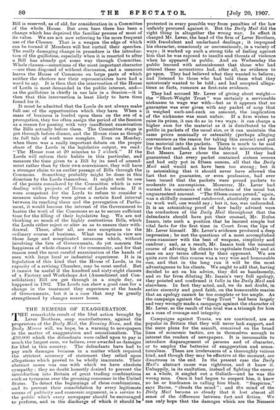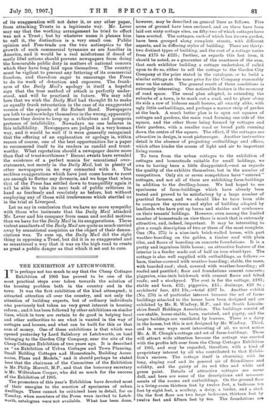THE NEMESIS OF EXAGGERATION. T HE remarkable result of the libel
action brought by Lever Brothers, soap manufacturers, against the proprietors of the Daily Mail, the Evening News, and the Daily Mirror will, we hope, be a warning to newspapers in the matter of exaggeration and sensationalism. The £50,000 which the defendants were called upon to pay is much the largest sum, we believe, ever awarded as damages for libel in this country. The defendants have had to ply such damages because in a matter which required the strictest accuracy of statement they relied upon allegations which proved to be wholly inaccurate. Their abstract cause was one with which we have absolute sympathy : they no doubt honestly desired to prevent, the introduction into Britain of great trading combinations• such as tyrannise over the groaning consumer in the United States. To detect the beginnings of these combinations, and to prevent their consolidation by every legitimate Means of publicity and economic argument, is a service to the public which every newspaper should be encouraged to perform, and in the discharge of which it should be protected in every possible way from penalties of the law unfairly procured against it. But the Daily Mail did the right thing in altogether the wrong way. In effect it charged Mr. Lever, the head of the firm of Lever Brothers, with fraudulent and underhand dealings ; it impugned his character, consciously or unconsciously, in a variety of ways ; it worked up such a strong tide of feeling against him that he was exposed to insults and threats of violence when he appeared in public. And on Wednesday the public learned with astonishment that those who had uttered these accusations bad, after all, no evidence to go upon. They had believed what they wanted to believe; had listened to those who had told them what they notoriously wanted to be told ; and had accepted allega- tions as facts, rumours as first-rate evidence.
They had accused Mr. Lever of giving short weight— the "Short-Weight Trust" was certainly a serviceable nickname to wage war with—but as it appears that no guarantee was ever given with any packet of soap that it weighed such-and-such an amount, the implication of the nickname was most unfair. If a firm wishes to raise its prices, it can do so in two ways : it can charge a higher sum for the material as it is distributed to the public in packets of the usual size, or it can maintain the same prices nominally or ostensibly (perhaps alleging convenience as the reason for taking this course) and put less material into the packets. There is much to be said for the first method, as the less liable to misconstruction. But Messrs. Lever chose the second. If they had guaranteed that every packet contained sixteen ounces and had only put in fifteen ounces, all that the Daily Mail said would not have been too strong ;• but it is astonishing that it should never have allowed the fact that no guarantee, or even profession, had ever been issued that the packets were pound packets to moderate its assumptions. Moreover, Mr. Lever had warned his customers of the reduction of the usual but unguara,nteed amount. "The fifteen-ounce pound," again, was a skilfully conceived catchword, absolutely sure to do its work well, one would say ; but it, too, was unfounded. It is an astonishing proof of how badly advised were the conductors of the Daily Mail throughout that the defendants should have put their counsel, Mr. Rufus Isaacs, into such a position that he learned simple but vital facts for the first time in Court from the lips of Mr. Lever himself. Mr. Lever's evidence produced a deep impression ; he met the questions of a most accomplished cross-examiner with the best of weapons, simplicity and candour ; and, as a result, Mr. Isaacs took the unusual course of advising his clients to capitulate frankly and at once on any terms offered by their opponent. We are quite sure that this course was a very wise and honourable one, and that in the long run it will be the most advantageous to his clients. •We ought to add that, having decided to act on his advice, they did so handsomely, and so far from diluting Mr. Isaacs's very full apology, they pointed and confirmed it fully in the Daily Mail and elsewhere. In fact they acted, and, we do not doubt, in entire sincerity and good faith, on the honourable maxim that an apology cannot be too complete or too ample. As the campaign against the "Soap Trust" had been largely and very wrongly made a campaign against the character of Mr. Lever, so the result of the trial was a triumph for him as a man of courage and integrity.
Campaigns against Trusts, we are convinced, are so popular in Britain that they will never lack support, and the mere plans for the assault, conceived on the broad lines of economic tactics, are in themselves enough to interest the readers of newspapers. It is inexcusable to introduce disparagement of persons and of character, or to employ, the batteries of exaggeration and sensa- tionalism. These are irrelevances of a thoroughly vicious kind, and though they may be effective at the moment, are disastrous in the end. In the present case the Daily Mail's abstract cause was righteous, and it knew it. Unhappily, in its exaltation, instead of fighting the enemy as a whole, it singled out a Goliath—and he was the wrong man. Once it had begun to suspect him, it knew no let or hindrance in calling him black. "Suspicion," says Bacon, "clouds the mind"; and the mind of the Daily Mail became so cloudy that it lost almost all sense of the difference between fact and fiction.. We can only hope that the damages which are the -Nemesis of its exaggeration will not deter it, or any other paper, from attacking Trusts iu a legitimate way. Mr. Lever may say that the working arrangement he tried to effect was not a Trust ; but by whatever name it pleases him to call it, the distinction is a very small one. Public opinion and Free-trade are the two antiseptics to the growth of such commercial tyrannies as are familiar in America, and it would be a real misfortune if dread of costly libel actions should prevent newspapers from doing the honourable public duty in matters of national concern which they have long laid upon themselves. • The country must be vigilant to prevent, any fettering of its commercial freedom, and therefore eager to encourage the Press to do its work of detection and exposure. The frank- ness of the Daily Mail's apology is itself a hopeful sign that the true method of attack is perfectly under- stood, and will be practised in future. We may add here that we wish the Daily Mail had thought fit to make an equally frank retractation in the case of its exaggerated version of the episode of Sir Robert Bond. Newspapers are loth to acknowledge themselves in the wrong, apparently because they desire to keep up a ridiculous and pompous pretence of infallibility. Nowadays no one believes in this infallibility. Newspapers are judged in a very human way, and it would be well if it were generally recognised that the offering of an explanation or apology is, within reason of course, one of the best opportunities for a paper to recommend itself to its readers as candid and trust- worthy. What reputation should a newspaper desire more than that of trustworthiness ? Recent events have revealed the existence of a perfect mania for sensational over- statement, not merely in the Daily Mail, but in plenty of other newspapers in no way connected with it. The reckless exaggerations which have just come home to roost are enough to flutter any dovecote, and we hope that when that of the Press has settled down to tranquillity again it will be able to take its next task of public criticism in hand as fearlessly and resolutely as before, but without employing any of those wild irrelevances which startled us in the trial at Liverpool.
Let us say in conclusion that we have no more sympathy with those who insinuate that the Daily Mail attacked Mr. Lever and his company from mean and sordid motives than we have for the Daily Mail in its exaggerations. These violent assailants of the Daily Mail are quite as much carried away by sensational suspicion as the object of their denun- ciations was. To sum up, the Daily Mail did the right thing in opposing a Trust, but did it in so exaggerated and so sensational a way that it was on the high road to create as great a public danger as that which it set out to cure.







































 Previous page
Previous page